9 Unhealthiest Canned Pasta Dishes Still Lurking on Shelves
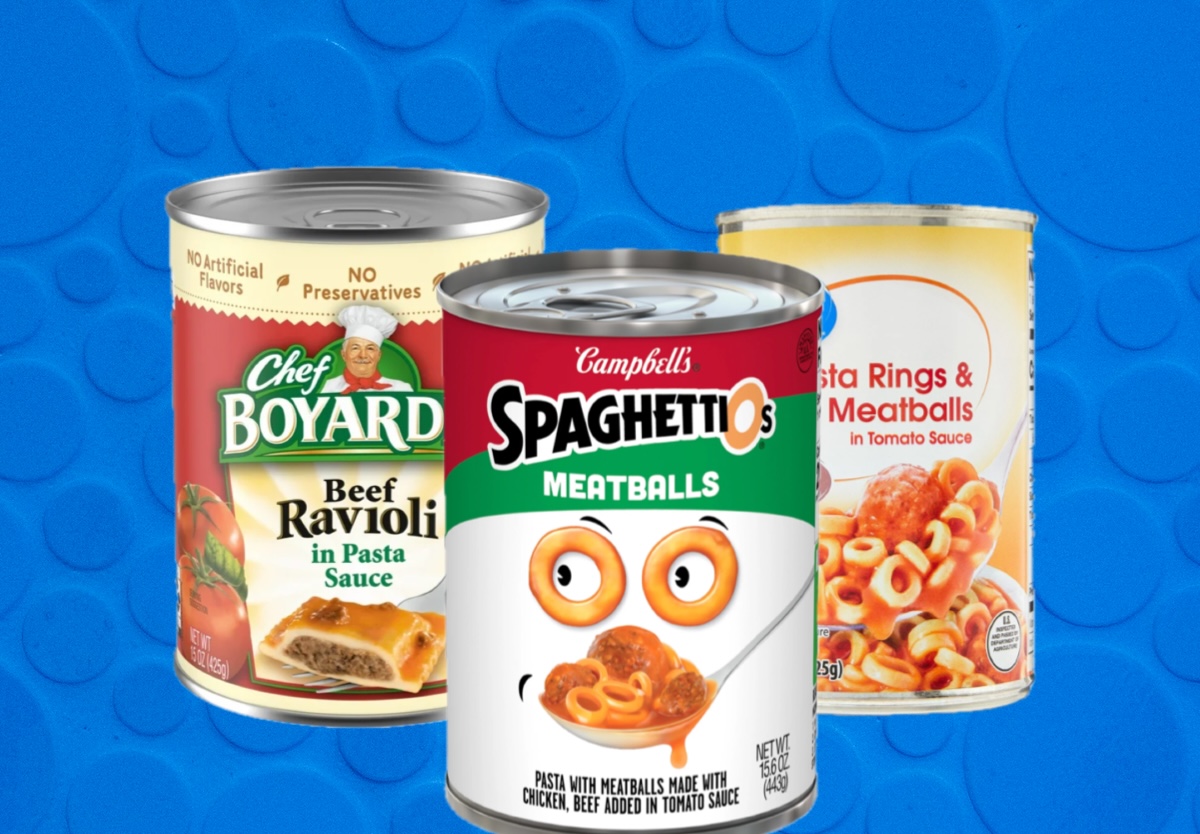
Pasta in a can isn’t the first thing you turn to for a gourmet and nutritious meal, but you can’t beat the convenience. It’s fast, cheap, somewhat tasty and hits the spot. Plus, it has a sense of nostalgia for adults who were more familiar with Chef Boyardee as a kid than authentic pasta. While canned pasta has its place, it’s not healthy.
“While canned pasta can be convenient and affordable, many are high in sodium, added sugars, unhealthy fats, and high-risk additives,” Dr. Federica Amati, Head Nutritionist at ZOE says. “Over time, regularly eating these foods can contribute to poor metabolic health, weight gain, and an increased risk of chronic diseases like heart disease and type 2 diabetes.”
Reading the labels is essential for making well informed health choices so before putting canned pasta in your cart, here’s a few key things to look for:
Calories: Depending on age range and fitness goals, on average, the guidelines for calorie intake range between 1,600 to 2,000, per Cleveland Clinic.
Saturated fat: Saturated fat is something you’ll often find in canned pasta. According to the American Heart Association, if you’re following a 2,000-calorie-a-day diet, you should not have more than 13 grams of saturated fat. Too much can lead to serious health issues like high cholesterol and heart disease.
Sodium: Many canned pastas are loaded with salt for flavor. While it might be tasty, you’re risking your heart. The American Heart Association says too many Americans consume more salt than recommended. The organization suggests having no more than 2,300 milligrams a day, but many people have 3,500mg daily.
Sugar: According to the American Heart Association, women shouldn’t have more than 6 teaspoons of sugar a day, which is around 100 calories, and for men, no more than 9 teaspoons or 150 calories per day.
Other things to look for according to Dr. Amati include:
-Short ingredient lists
-Minimal added sugars
-No processed meat
-Prioritize options that include whole ingredients like beans, vegetables, and whole grains.
Now that you’re armed with vital information on how to shop for canned pasta, here are the unhealthiest ones on shelves per Dr. Amati ranked in order from bad to worst.
Great Value Spaghetti Rings in Tomato Sauce
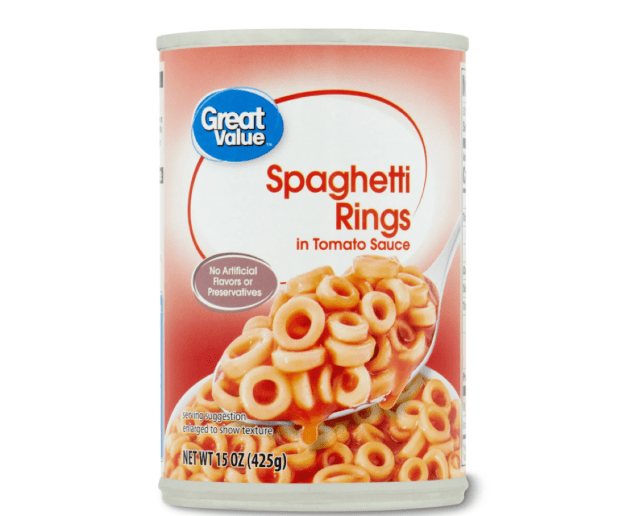
Calories: 270
Fat: 1.5g (Saturated fat: 0g)
Sodium: 970mg
Carbs: 57g (Fiber: 4g , Sugar: 23g)
Protein: 8g
Great Value Spaghetti Rings in Tomato Sauce is budget-friendly at .98 cents a can, but you’re putting your health at risk if you eat this canned pasta too often.
“One can has almost half of your daily value of sodium and more than one-third of your daily value for added sugars,” says Dr. Amati. “It also contains high fructose corn syrup, which is associated with an increased risk of developing metabolic conditions.”
Campbell’s Canned Spaghetti
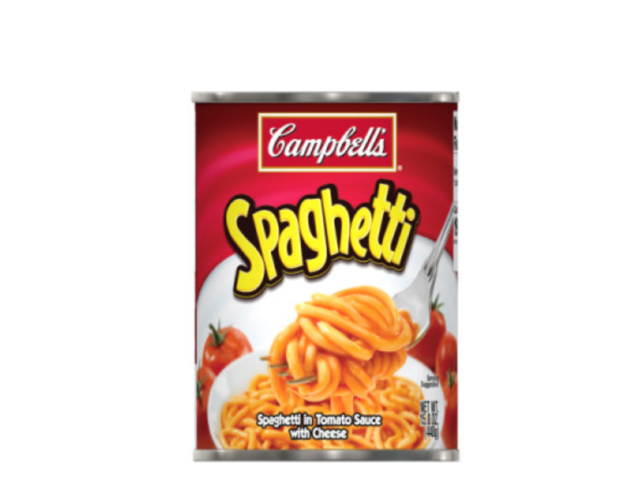
Calories: 340
Fat: 1.5g (Saturated fat: 0.5g)
Sodium: 1,690mg
Carbs: 70g (Fiber: 5g , Sugar: 24g)
Protein: 11g
Campbell’s Canned Spaghetti is advertised as no “added MSG” but there’s plenty of other unhealthy things about the pasta like how it’s packed with salt and sugar.
Dr. Amati says, “One can contains 73% of your Daily Value of sodium and 24 grams of sugar. It also contains a long list of additives, including high fructose corn syrup, which is linked to an increased risk of developing metabolic conditions.”
Chef Boyardee Beef Ravioli
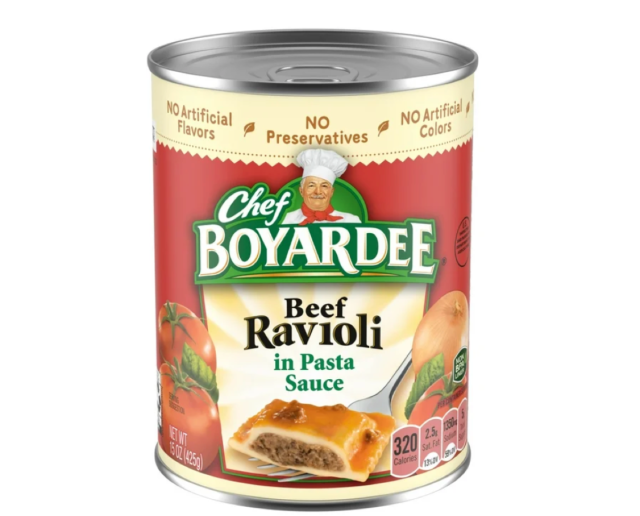
Calories: 220
Fat: 7g (Saturated fat: 2.5g)
Sodium: 800mg
Carbs: 33g (Fiber: 3g , Sugar:5 g)
Protein: 7g
The serving size for Chef Boyardee Beef Ravioli is only one cup, while the others have been the entire can. Most will eat more than one serving so double the amount of salt and sugar.
According to Dr. Amati, “This product has one-third of your daily value of salt in just half a can, and a whole can has more than one-quarter of your saturated fat daily value. It also contains high fructose corn syrup and a couple of emulsifiers.”
Great Value Macaroni & Beef
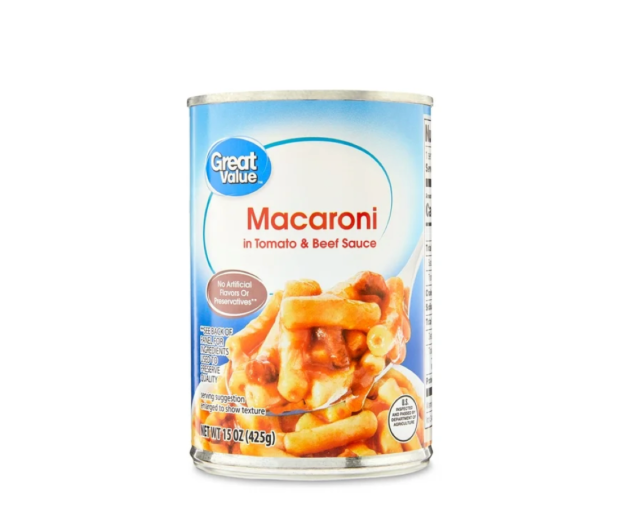
Calories: 330
Fat: 11g (Saturated fat: 4g)
Sodium: 1,230mg
Carbs: 47g (Fiber: 3g , Sugar: 11g)
Protein: 11g
Great Value Macaroni & Beef is full of unhealthy ingredients and is problematic for several reasons in terms of health.
“A tin of this product contains more than half of your daily value of salt and 10% of your DV of added sugars,” says Dr. Amati. “It’s also high in saturated fats, which are associated with an increased risk of cardiovascular disease, and high fructose corn syrup. This product also contains beef, and high intakes of red meat are associated with an increased risk of health issues, including heart disease.”
Great Value Spaghetti Rings Pasta with Meatballs in Tomato Sauce
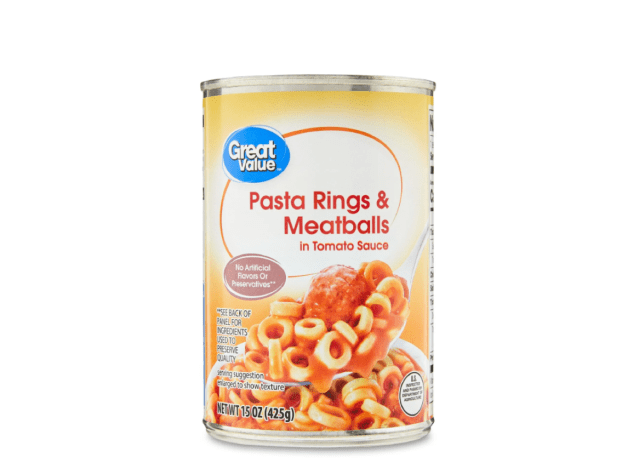
Calories: 390
Fat: 14g (Saturated fat: 5g)
Sodium: 1,050mg
Carbs: 48g (Fiber: 4g , Sugar: 15g)
Protein: 17g
At .98 cents a can, Great Value Spaghetti Rings Pasta with Meatballs in Tomato Sauce is a really cheap way to try to fill up but the lack of fiber and nutrition will actually keep you hungry.
“This product contains 25% of your saturated fat daily value per can and processed meat, both of which are linked to heart disease if consumed in large amounts over the years,” says Dr. Amati. “One can of this product has almost half of your sodium daily value, and regularly consuming products that are high in sodium is linked to high blood pressure.”
Chef Boyardee Beefaroni
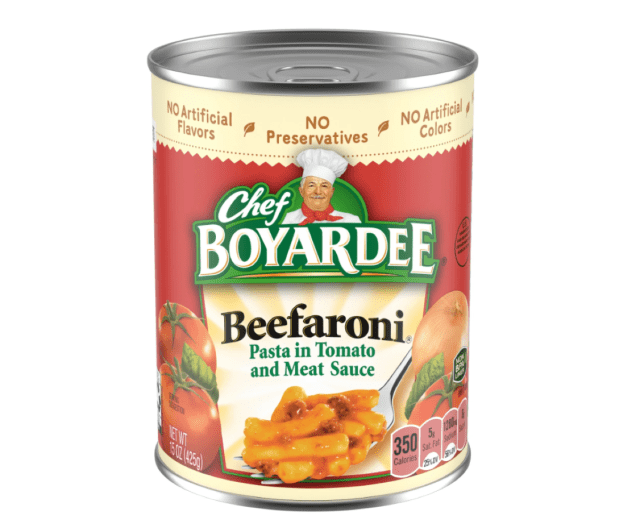
Calories: 350
Fat: 13g (Saturated fat: 5g)
Sodium: 1,280mg
Carbs: 48g (Fiber: 2g , Sugar: 8g)
Protein: 10g
Chef Boyardee Beefaroni was a pantry staple for many as kids, but it doesn’t have nutritional value and contains unhealthy ingredients.
“One tin contains one quarter of your Daily Value of saturated fat and a small amount of trans fats, both of which are linked to poorer health,” Dr. Amati explains. “It also has more than half of your daily value for sodium and contains emulsifiers and high fructose corn syrup.”
SpaghettiOs Original Canned Pasta
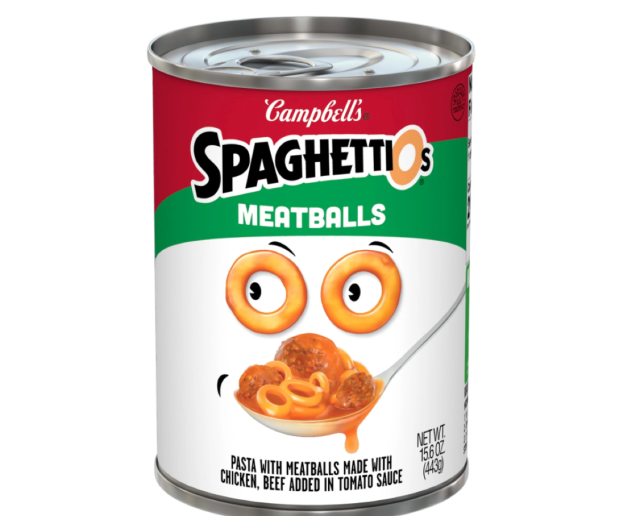
Calories: 420
Fat: 3g (Saturated fat: 1g)
Sodium: 1,510mg
Carbs: 83g (Fiber: 8g , Sugar: 30g)
Protein: 14g
Another childhood favorite is Spaghettios Original, but it’s not good healthwise.
“This product is high in sodium and added sugars,” Dr. Amati states. “The tin also has a misleading ‘health halo’ – the tin suggests that it contains “20% of daily vegetables.” These kinds of claims are used by manufacturers to trick customers into thinking that a product is healthy when, in reality, it’s not. In fact, more often than not, if a product has a health claim on the pack, it’s probably not very good for you.”
Chef Boyardee Spaghetti & Meatballs
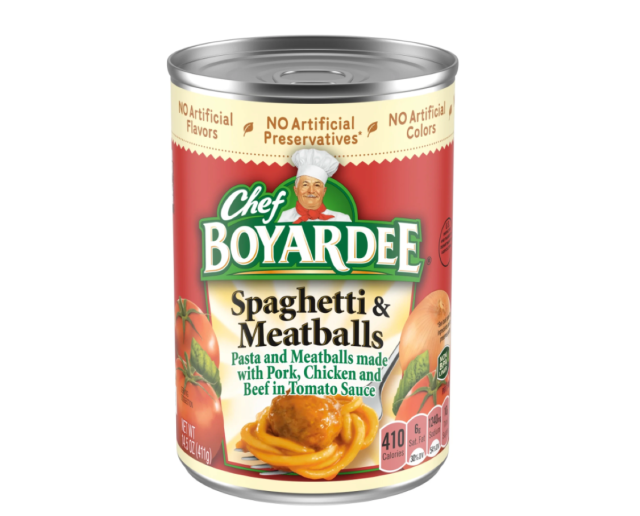
Calories: 410
Fat: 17g (Saturated fat: 6g)
Sodium: 1.240mg
Carbs: 49g (Fiber: 3g , Sugar: 10g)
Protein: 14g
Chef Boyardee Spaghetti & Meatballs might have a special place in your heart because it conjures up childhood memories when things were simpliers, but it shouldn’t hold pantry space.
“One can has almost half of your Daily Value of sodium and 16% of your Daily Value of added sugar,” says Dr. Amati. “Importantly, it also contains processed meat, and research shows that regularly consuming processed meats is linked to an increased risk of health conditions, such as heart disease and diabetes. It also contains three different emulsifiers, which may impact your gut health.”
Chef Boyardee Mac & Cheese
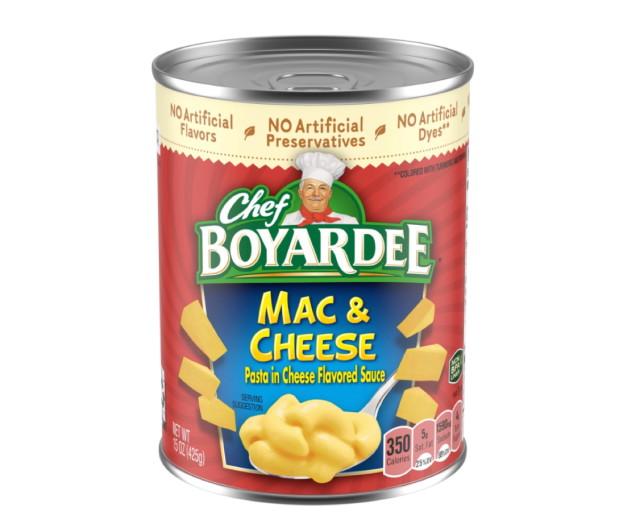
Calories: 410
Fat: 17g (Saturated fat: 7g)
Sodium:1,320 mg
Carbs:51g (Fiber: 3g , Sugar: 6g)
Protein: 13g
Chef Boyardee Mac & Cheese is go-to for many, but it has so much and saturated fat, it’s the No. 1 worst offender of canned pasta on our list.
“One tin has more than one-third of your daily value for saturated fat and well over half of your daily value of sodium,” Dr. Amati says. “Again, this product’s label carries health halos, like ‘No artificial flavors.’ This is a common marketing ploy as people automatically equate “natural“ with health and ‘artificial’ with poor health. This is a trick. Some artificial ingredients can support health, while some entirely natural ingredients can be bad for you.”